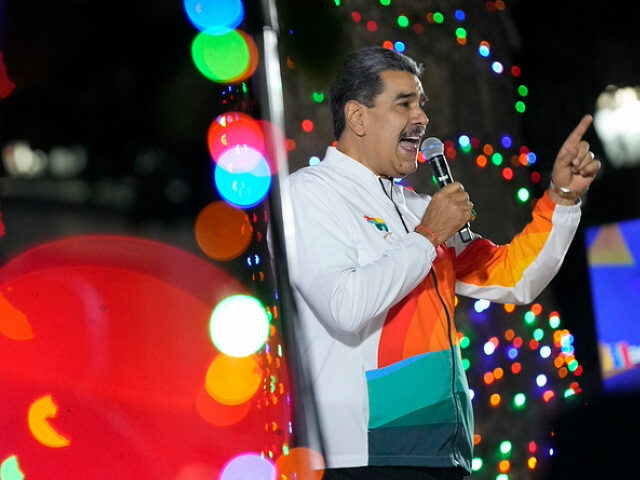The Episcopal Conference of Venezuela (CEV) rejected on Tuesday the political use of Christmas carried out by socialist dictator Nicolás Maduro, who, once again, rescheduled the start of Christmas in Venezuela to benefit his agenda.
On Monday, Maduro, during the latest broadcast of his weekly television show, Con Maduro Más (“With Maduro Plus”), announced he was moving the start of Christmas to October 1. The socialist dictator claimed the decision to move Christmas was to express his “gratitude” to Venezuelans in the aftermath of the July 28 sham presidential election, which Maduro and the Venezuelan institutions under his control fraudulently insist he “won.”
“September is coming, and I said, ‘September and it already smells like Christmas,’” Maduro said. “And that’s why this year, in homage to you, in gratitude to you, I’m going to decree the advancement of Christmas to October 1.”
“Christmas begins on October 1 for everyone. Christmas has arrived with peace, happiness, and security,” he continued.
CEV, as the top ecclesiastical authority in Venezuela, responded to Maduro’s rescheduling of Christmas through a statement issued on its Instagram account. CEV pointed out that the 2024 season of Advent — a four-week season of remembering and celebrating the arrival of Jesus Christ on Earth — begins on December 1.
https://www.instagram.com/p/C_djFF7Pjfs/?utm_source=ig_embed
“Christmas, as a liturgical season, begins on December 25 with the birth of our Lord Jesus Christ and extends until the Epiphany of the Lord in January,” the statement reads before roughly quoting St. John Paul II:
“Christmas is a historical event full of mystery: a tender child is born, fully human, but who is at the same time the only-begotten Son of the Father. Son of the same nature as the Father, “God from God, Light from Light, true God from true God.” He is the Word, “by whom all things were created.”
“Therefore, Christmas is a celebration of universal character. The manner and time of its celebration is a matter for ecclesiastical authority. This feast should not be used for propagandistic or political purposes,” the statement concluded.
The Venezuelan socialist regime has maintained a longstanding animosity toward the Venezuelan Catholic Church that goes all the way back to the days of the late socialist dictator Hugo Chávez, who died of an undisclosed type of cancer in March 2013.
In 2018, Maduro accused Catholic bishops of being “devils in cassocks,” while high-ranking members of his regime have issued threats against the Venezuelan Catholic Church on several previous occasions in response to the Church’s criticism of the authoritarian regime.
While the Maduro regime maintains its antagonistic stance with the country’s Catholic Church, it has weaponized the Christian faith in the past to further its ideological goals — such as in 2014, when the ruling socialists “rewrote” the Lord’s Prayer to worship Hugo Chávez shortly before the first anniversary of his death. Maduro has also made extensive efforts to cultivate friendly relations with the Venezuelan Evangelical Christian community, which the socialist dictator declared “the true church of God” in January 2023.
Maduro’s latest rescheduling of Christmas marks the sixth year in a row that the socialist dictator has changed the start of the Christian holiday season to suit his agenda. Maduro first put the idea into practice in 2013, the year he succeeded the late socialist dictator Hugo Chávez as the head of the Venezuelan socialist regime.
The Venezuelan dictator has been accused in the past of rescheduling Christmas as part of “political maneuvers” that seek to distract public opinion from Venezuela’s precarious situation and political turmoil.
The announcement of the rescheduling of 2024’s Christmas took place hours after the Venezuelan Public Prosecutor’s Office issued an arrest warrant against opposition leader Edmundo González, who ran against Maduro in the July 28 sham presidential election.
Venezuelan electoral authorities proclaimed Maduro the “winner” of the July election after allegedly obtaining roughly 51 percent of the votes. However, the electoral authorities refuse to publish vote results or any documentation that can corroborate the claimed “results,” leading to growing international condemnation and nationwide protests, which Maduro and his regime responded to with a brutal persecution campaign.
The Maduro regime’s brutal crackdown and persecution of dissidents following the sham July election has left more than 25 dead, roughly 200 injured, and the arbitrary arrest of 2,400 individuals — including 129 minors, of which 86 were reportedly released on Sunday. Maduro announced shortly after the start of the crackdown that the detainees would be sent to “reeducation camps” located in prisons that the regime emptied of its inmates in late 2023.
The international community has contested Maduro’s persecution of dissidents and the claimed “results,” particularly in light of the Venezuelan opposition publishing copies of more than 80 percent of the election’s vote tallies collected from local voting stations that indicate that González defeated Maduro in a landslide.
In late 2023, when Maduro decreed the start of that year’s Christmas in November, the socialist dictator asserted that it would be the “best Christmas ever,” as the rogue socialists were, at the time, benefiting from a generous six-month-long oil and gas sanctions relief package granted by the administration of U.S. President Joe Biden in October and which expired in April.
The sanctions relief package, which granted a noticeable oil windfall for the Venezuelan regime throughout its duration, was part of a now-failed effort of the Biden administration to entice Maduro to hold a “free and fair” election in Venezuela — an idea Secretary of State Antony Blinken spent years promoting in the region.

COMMENTS
Please let us know if you're having issues with commenting.